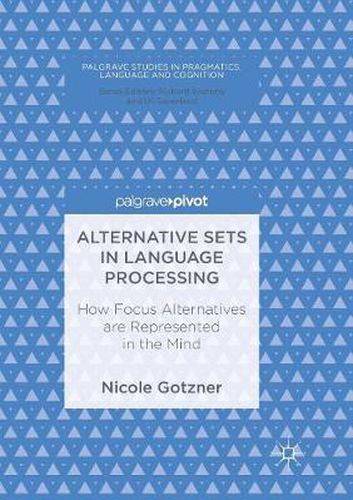Readings Newsletter
Become a Readings Member to make your shopping experience even easier.
Sign in or sign up for free!
You’re not far away from qualifying for FREE standard shipping within Australia
You’ve qualified for FREE standard shipping within Australia
The cart is loading…






This title is printed to order. This book may have been self-published. If so, we cannot guarantee the quality of the content. In the main most books will have gone through the editing process however some may not. We therefore suggest that you be aware of this before ordering this book. If in doubt check either the author or publisher’s details as we are unable to accept any returns unless they are faulty. Please contact us if you have any questions.
This book presents a novel experimental approach to investigating the mental representation of linguistic alternatives. Combining theoretical and psycholinguistic questions concerning the nature of alternative sets, it sheds new light on the theory of focus and the cognitive mechanisms underlying the processing of alternatives. In a series of language comprehension experiments, the author shows that intonational focus and focus particles such as ‘only’ shape the representation of alternatives in a listener’s mind in a fundamental way. This book is relevant to researchers interested in semantics, pragmatics, language processing and memory.
$9.00 standard shipping within Australia
FREE standard shipping within Australia for orders over $100.00
Express & International shipping calculated at checkout
Stock availability can be subject to change without notice. We recommend calling the shop or contacting our online team to check availability of low stock items. Please see our Shopping Online page for more details.
This title is printed to order. This book may have been self-published. If so, we cannot guarantee the quality of the content. In the main most books will have gone through the editing process however some may not. We therefore suggest that you be aware of this before ordering this book. If in doubt check either the author or publisher’s details as we are unable to accept any returns unless they are faulty. Please contact us if you have any questions.
This book presents a novel experimental approach to investigating the mental representation of linguistic alternatives. Combining theoretical and psycholinguistic questions concerning the nature of alternative sets, it sheds new light on the theory of focus and the cognitive mechanisms underlying the processing of alternatives. In a series of language comprehension experiments, the author shows that intonational focus and focus particles such as ‘only’ shape the representation of alternatives in a listener’s mind in a fundamental way. This book is relevant to researchers interested in semantics, pragmatics, language processing and memory.